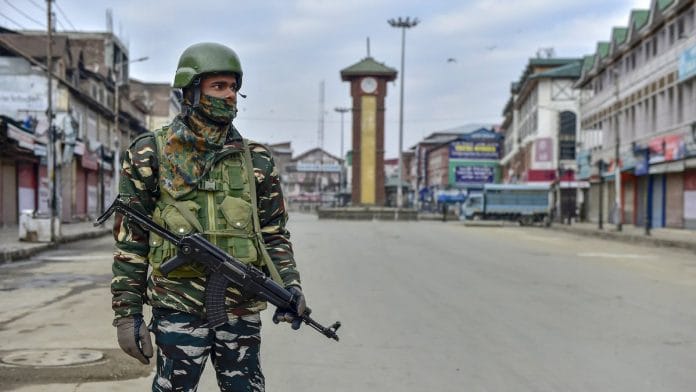Srinagar: Security forces in Jammu & Kashmir have intensified counter-insurgency operations in the Valley after going slow in April and May, possibly to avoid law and order situations during the Lok Sabha elections.
According to police data, 60 militants were killed in around 45 encounters in Jammu & Kashmir between January and March. The numbers for April and May – when polling was on – are far lower at 27 deaths in eight encounters. Of these, nine militants were killed in four gun battles this week alone, days after the state’s five-phase election concluded 6 May.
While one militant was killed in the Valley in an encounter Friday, five militants, two civilians and two soldiers were killed in two gun battles Thursday. Three more militants were killed Saturday in a gun battle in Pulwama. With Saturday’s encounter, the total number of militants killed this year has reached 87.
As reported by ThePrint earlier, security agencies had been concerned about holding elections in the Valley in the wake of the 14 February Pulwama attack, heightened tensions with Pakistan following the Balakot airstrikes on 27 February, and Kashmir’s previous trysts with polling-day violence.
However, though marred by a low turnout, the election in Kashmir was by and large peaceful this year, with no major incident of violence reported.
‘No directions on slowing down’
Police, however, officially maintained that there was no slowdown in counter-insurgency ops during the election season, saying they acted “as and when” intelligence was received.
“There were no directions issued to us on slowing down counter-insurgency operations,” a senior Jammu & Kashmir Police officer told ThePrint.
“We took action as and when we received credible intelligence on militants. However, maintaining peace and a stable environment for the Lok Sabha elections was our top priority,” added the officer who did not wish to be identified.
A senior officer in the Central Reserve Police Force (CRPF) told ThePrint that the possible law-and-order implications of encounters were taken into account during election time, but not at the cost of credible intelligence.
“We were avoiding situations that could have resulted in protracted law and order situations, stone-pelting, clashes etc,” said the officer. “That in no way means we did not act on credible intelligence brought to us,” he added.
Fear of protests
However, data shows that between 11 April and 6 May (the first and the last day of polls in Kashmir), just eight militants were killed in four encounters – an unusually low number, especially in light of the trend witnessed in the first three months of the year. This indicates security forces may have gone slow on counter-insurgency ops over fears of death of militants triggering a law and order in the Valley.
In Kashmir, fierce protests have become the norm during counter-insurgency operations or after the killing of militants, especially since the death of Hizbul Mujahideen commander Burhan Wani in July 2016.
This has even prompted state police to issue explicit public appeals for peace in the press releases sent out during or after gun battles.
Every police press release now ends with this message – “Citizens are requested not to venture inside the encounter zone since such an area can prove dangerous due to stray explosive materials. People are requested to cooperate with police till the area is completely sanitised and cleared of all the explosive materials if any.”
According to official sources, there are around 340 militants currently active in the Valley, both local and Pakistani.
Also read: Tinkering with Article 370 or 35A will be disastrous for Jammu and Kashmir: Omar Abdullah






